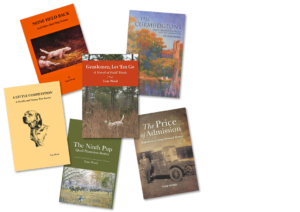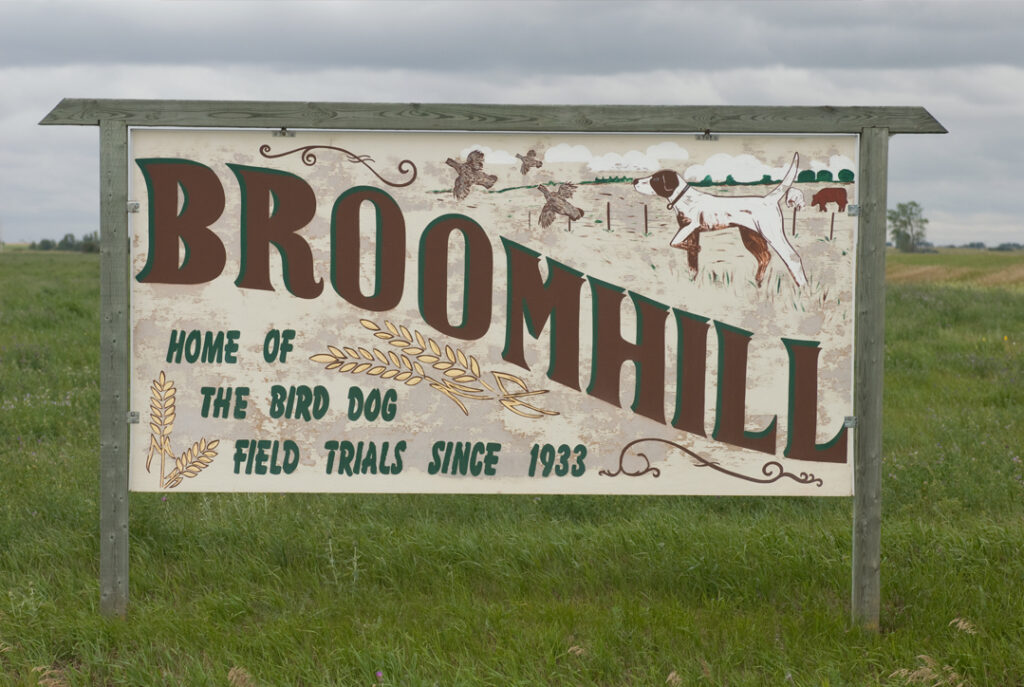The year is 1947. The War is finally over, in Europe and Japan. Veterans of the War, leaving home for it as boys, have returned as men, matured by a baptism of fire, some wounded physically, more wounded emotionally, but sharing joy it is over along with its scars.
They are at Broomhill, Manitoba, having trained bird dogs nearby since mid-July. It is the first week in September, time for the Canadian prairie trials, resuming after the War. Mose Blevins had been a scout all his adult life, and now he is fifty-five, not old, but his arthritis is taking its toll. His son Robert is home from the War in Europe. He is twenty-six, hoping to succeed his father as a dog man on Twin Oaks Plantation in Southwest Georgia.
Twin Oaks is one of the few shooting estates where the owner cares about field trials. That owner, Harley Grant, an investment banker, uses Twin Oaks both as a family retreat and for business entertainment. It has helped land Harley’s firm many an IPO and bond underwriting engagement-most corporate leaders love to shoot quail. And Harley has been taught to love field trials by his father, a business partner of Walter Teagle of Standard Oil, who used Norias as his kennel name and the name for a partnership-owned shooting estate near Twin Oaks.
Harley Grant’s field trial handler is John Doors, a white man. Mose and Robert are black. White-black handler-scout teams are the rule, not the exception, in North American field trials as they have been since before the century’s turn.
The scouts have worked with the dogs since their whelping, even assisted in the whelping, fed them, cleaned their runs, fondled them, spoken to them, walked them, yard worked them, roaded them, broke them. They know the entries they scout intimately, can guide them silently back to the front or heel them with a whispered “heel.”
They are at the Dominion Club’s trial.
The stakes will be an All-Age, a Derby and the Dominion Championship, all Open stakes, meaning handlers will mostly be professionals, though amateur handlers may enter.
With Harley Grant’s permission, Robert will scout when Harley’s first entry in the thirty-minute All-Age, the first stake to run, commences. Mose will ride front. This is a chance for Robert to show Harley Grant and John Doors he can be a worthy successor to his father.
The plan of the father-son team is this. Mose has been teaching Robert the scout role since boyhood before the War, so Robert knows well the rules, or really the rule:
Scout must ride behind the judge assigned to his entry. In reality, the rule is, scout shall not be seen riding in front of that judge. If the scout can ride in front but not be seen doing so, and help his entry, the rule is not broken, but woe be to the scout riding in front who is seen doing so.
Mose knows the courses here like the back of his hand. Knows where chickens and Huns likely are at any time of day. He draws Robert a map of the course on note paper and marks on it the bluffs (patches of poplar bushes) and buffalo wallows. Tells Robert how best to get his entry to them without being detected riding in front.
Harley Grant’s first drawn entry in the All-Age stake is a male first-year pointer named Twin Oaks Tim. Robert has worked Tim since his puppy summer. He knows Tim’s strengths (naturally front running, biddable, a good nose) and weakness (somewhat lacking in natural range). His job (and that of handler John Doors) is to exploit the strengths and hide the weakness. Not an easy task for a handler or a scout. John Doors knows Tim and his traits just as Robert does.
Tim’s bracemate is Cantankerous, a setter handled by Red Cole of Mississippi and owned by Tom Raines, a Delta cotton farmer. Cantankerous is well named. He has great range but a tendency to go where he wants, not always to the front.
“Gentlemen, let ‘em go,” says the senior judge and Tim and Cantankerous released by their scouts, break for the front, their handlers singing low behind them, their scouts remounting.
At twenty minutes, Tim has found chickens twice, had point called for him on each find by Robert, and held steady at flush. Cantankerous has been glimpse twice by the judge assigned to him, once far left, once far right, but in each case slightly forward. Then both dogs disappear and the thirty minutes expire. Robert will have ten minutes to show Tim to the judges, which he does with thirty seconds to spare. Harley congratulates Robert. Tom Raines bears a scowl.
When the All-Age stake has been run, the judges huddle and then announce the three winners. Tim gets first. Again, Harley Grant congratulates Robert for his work scouting Tim. He notices Tom Raines scowling again.
After the judges announce that the Derby stake will commence after a lunch break (lunch being bagged sandwiches carried on the dog truck), Tom Raines approaches the senior judge with a complaint.
“Mose Blevins is riding front for Harley Grant’s entries. Mose is a negro, he can scout but he cannot handle or ride front. Only a white man can do that.”
The senior judge is a Canadian, Bill Goins, resident of Gainsborough. He has been a flight instructor at nearby Brandon for the British Commonwealth Air Training Plan (BCATP) or Empire Air Training Scheme (EATS), the British-Canadian agreement under which airmen for the War from England, Canada, Australia, South Africa and other British Commonwealth nations were trained in Canada, beginning in 1939.
In mid 1940, President Roosevelt had by clandestine Executive Order permitted Americans to emigrate to Canada to join the Royal Canadian Air Force or Royal Air Force and be exempted from the US Draft, this even though the US was officially still neutral.
This was how Robert Blevins had gone to the War. As a lad of eighteen he had come to the prairies to train bird dogs with his father and while here learned of EATS and taken advantage of President Roosevelt’s clandestine order and signed up for pilot training by the RCAF under EATS at nearby Brandon, Manitoba. When the U.S. entered the War after Pearl Harbor, he had transferred to the U.S Army Air Force and become a Tuskegee Airman. The Canadian judge at the Dominion trial, Bill Goins, had been one of his flight instructors at Brandon.
Bill Goins is enraged by Tom Raines’ complaint.
“Mr Raines, you are in Canada, not Mississippi. We have no rule prohibiting a Negro from riding front. If you do not like it, withdraw your dogs and get your sorry ass back south of the border. Robert Blevins just fought bravely for your freedom and risked his life many times for you. I helped train him as a pilot. His father is welcomed to ride front here.”
Twin Oaks Tim wins Runner-Up in the Championship, Robert Blevins scouting, Mose Blevins riding front.
* * * * *
Love these stories? Tom Word books are available online in the Strideaway store. Great summer reading!

